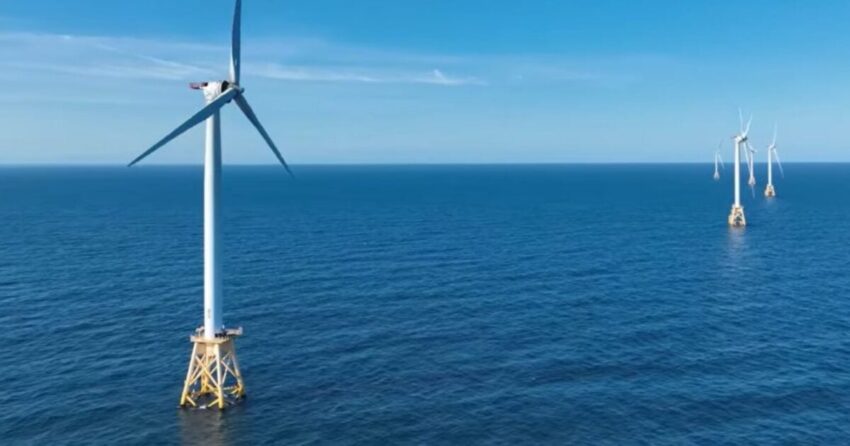
Wind and solar companies are increasingly shelling out for specialized insurance to protect against weather risks, like the sun not shining enough, the wind not blowing enough or storms wiping out energy infrastructure, according to Bloomberg.
Though green energy zealots are banking on wind and solar to replace fossil fuels and slow the effects of climate change, companies are reportedly turning to parametric insurance, which can rapidly pay companies when specific unfavorable weather conditions occur, according to Bloomberg. While the Biden administration pushed for a build out of wind and solar technology to combat climate change, measly wind and solar outputs as well as extreme weather events have been straining the global industry, Bloomberg reported.
“There’s uncertainty over whether or not parametric insurance will make solar and wind energy companies less susceptible to risk. These companies, however, are already risk prone as they require non-market backing in the form of subsidies and even bailouts when their technology falters or their projects are cancelled,” Gabriella Hoffman, director of the Center for Energy & Conservation at the Independent Women’s Forum, told the Daily Caller News Foundation. “In this new U.S. era of energy deregulation, the viability of solar and wind is being tested. Can these mature technologies thrive without government backing? Can they adequately help meet growing electricity demand? If they can credibly compete with more reliable energy sources like natural gas, nuclear, and coal, great. If they can’t, the market will respond accordingly — regardless of parametric insurance coverage.”
Former President Joe Biden hailed wind and solar as a way to curb the impacts of climate change, pushing for green energy though tax credits, as well as billions in federal grants and loans. The energy technology Biden preferred is facing extreme weather damage, as winter storms batter wind turbines and hail pummels solar farms in Texas.
The issue exceeds beyond the United States, as cloudy and windless days in the United Kingdom and paltry wind generation in India may reportedly threaten green energy transition goals, according to Bloomberg.
French insurance company AXA XL Reinsurance notes on its website that parametric insurance is becoming increasingly popular for wind farm developers and that it helps cover companies when they can’t generate as much power as they budgeted for.
“Wind has continued to underperform in the last three to four years” Kailash Vaswani, chief financial officer of the Indian green energy company ReNew Energy Global Plc, told Bloomberg. Vaswani explained to Bloomberg that insurers are less likely to pay out unless declines are severe, given recent wind outputs. “It’s basically heads they win, tails you lose.”
Hoffman argued that the massive Danish-based wind company Orsted’s recently plummeting stock value serves as an example of why insurers might hesitate to back up wind companies.
“This is nothing short of a ‘green energy’ clown show. Solar and wind energy battered by the ‘global warming’ it is supposed to prevent!” Marc Morano, author and the head of Climate Depot told the DCNF. “What do these formerly heavily subsidized tax dollars ‘green’ energy sources claim is the solution to their inherent inability to deal with — weather?! They propose risky, massive, and high-premium insurance schemes, no doubt paid for by billions in taxpayer cash leftover that had already been lavished on the industries.”
In contrast to the Biden administration, President Donald Trump has focused on boosting conventional energy sources and has heavily critiqued solar and wind power, writing Wednesday on Truth Social that “any State that has built and relied on WINDMILLS and SOLAR for power are seeing RECORD BREAKING INCREASES IN ELECTRICITY AND ENERGY COSTS. THE SCAM OF THE CENTURY!”
While Biden focused on climate initiatives, Trump declared a national energy emergency and signed an executive order to “unleash American energy” on his first day back in the Oval Office. The Trump administration has moved to advance reliable energy technology like coal, oil and gas and nuclear as it has sounded alarms over an impending national energy crisis.
“Reliable, affordable, and secure energy enables everyday life to power on—even when the sun isn’t shining,” Energy Secretary Chris Wright wrote on X in May, noting that coal and natural gas serve as dependable power sources.
All republished articles must include our logo, our reporter’s byline and their DCNF affiliation. For any questions about our guidelines or partnering with us, please contact [email protected].
Click this link for the original source of this article.
Author: Audrey Streb
This content is courtesy of, and owned and copyrighted by, https://www.bizpacreview.com and its author. This content is made available by use of the public RSS feed offered by the host site and is used for educational purposes only. If you are the author or represent the host site and would like this content removed now and in the future, please contact USSANews.com using the email address in the Contact page found in the website menu.





